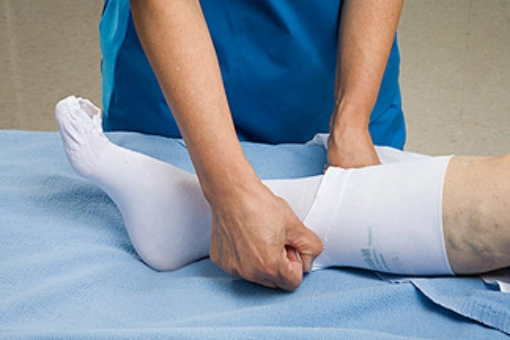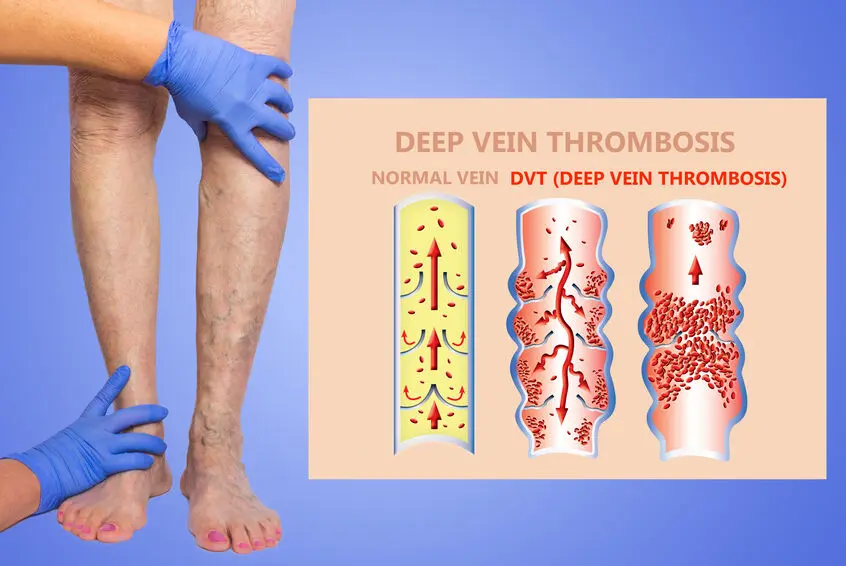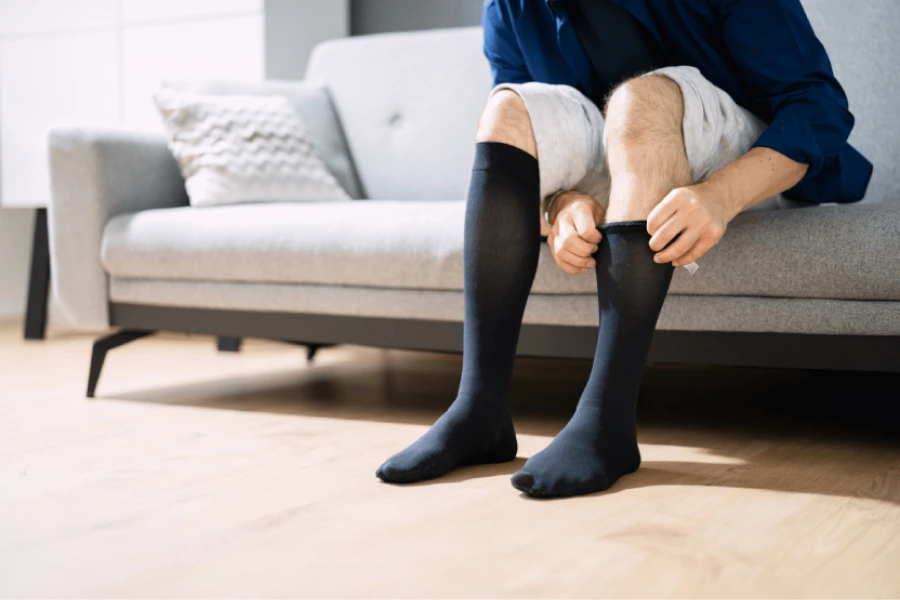Introduction
Deep Vein Thrombosis (DVT) is a serious health concern, especially for travelers, elderly patients, and individuals with limited mobility. Compression socks for DVT have become a crucial preventive solution, improving blood circulation and reducing clot risks. For brands and retailers in the healthcare and wellness sectors, offering high-quality compression socks tailored for DVT prevention presents a growing market opportunity. This blog explores the benefits, applications, and B2B sourcing insights related to compression socks designed specifically for DVT, helping your business meet the needs of diverse customer groups.

Understanding Compression Socks for DVT
Compression socks for DVT apply graduated pressure, which is strongest at the ankle and gradually lessens up the calf. This design helps improve venous blood flow by assisting veins in returning blood to the heart, reducing blood pooling and the risk of deep vein thrombosis (DVT). Medical professionals often recommend medical grade compression socks for DVT prevention and treatment due to their precise pressure control, measured in millimeters of mercury (mmHg).
Compression socks are classified by their compression level, with Class 1 (15-20 mmHg) typically used for mild prevention and Class 2 (20-30 mmHg) designed for more intensive support, such as post-surgery or chronic DVT management. Choosing the right class is crucial for effectiveness and safety.
In addition to pressure specifications, other features enhance the functionality of DVT compression socks. High-quality socks incorporate breathable, moisture-wicking yarns that keep feet dry and comfortable during extended wear. Reinforced heels and toes improve durability, while seamless designs reduce irritation, essential for patients wearing socks daily or during long flights.
For brands and retailers, highlighting these technical and comfort attributes adds value, especially when marketing to hospitals, rehabilitation centers, or specialty clinics. Understanding the differences between anti-embolism socks vs DVT socks and the role of hospital-grade compression socks further enables better product positioning. Educating B2B clients about the specific benefits and correct applications helps build trust and facilitates stronger partnerships.
Offering a well-designed, clinically supported product line positions your brand as a reliable supplier of medical compression socks for distributors and DVT compression socks bulk supplier options, meeting the growing demand for effective blood clot prevention.
Choosing the Right Compression Socks for Different DVT Needs
Selecting appropriate compression socks tailored to specific customer needs is crucial for effectively preventing and managing Deep Vein Thrombosis (DVT). Different user groups require specialized solutions that balance compression strength, comfort, and durability.
Compression Socks for Elderly DVT Patients
Older adults often benefit from compression socks designed specifically for elderly DVT care. These socks typically use soft, skin-friendly fabrics with moderate graduated compression to improve venous return while minimizing irritation. Comfort and ease of wearing are priorities, addressing sensitive or fragile skin and reduced mobility.
Hospital-Grade Compression Socks for Clinical Settings
DVT socks for hospital use must meet stringent hygiene and performance standards. Hospital-grade compression socks are essential post-surgery and for patients facing long-term immobility, reducing risks of blood clots during recovery. Medical grade compression socks for DVT provide reliable graduated compression, ensuring consistent pressure levels backed by testing and certifications.
DVT Compression Socks for Travel
Travelers, especially those on long flights or extended journeys, face elevated risks of blood clot formation due to prolonged inactivity. Lightweight, breathable DVT compression socks for travel encourage compliance by offering comfort over long wear periods. Brands focusing on this niche can appeal to travel companies and airlines as part of health-conscious service packages.
Therapeutic Socks for Rehabilitation and Clinics
Rehabilitation centers and vascular clinics demand therapeutic compression socks tailored to various patient mobility needs. These socks offer graduated mmHg compression designed to support recovery and improve circulation, helping prevent recurrent DVT.
DVT Compression Socks for Travel Market: Differentiation Through Care
Travel-related DVT prevention is an expanding market, as extended flights and long road trips increase clot risks. Travel companies and tour operators can differentiate their service by providing compression socks as part of a wellness package to their customers. This simple gesture reflects genuine care for traveler health and comfort, improving customer satisfaction and loyalty.

Supplying travelers with medical grade compression socks for DVT prevention supports better blood flow during flights, reducing swelling and fatigue. Tour operators who include these socks as part of their premium offerings can market themselves as health-conscious and attentive to safety. This approach appeals particularly to older travelers, business professionals on frequent flights, and wellness-focused tourists.
From a B2B perspective, partnering with compression socks bulk suppliers to offer branded or private label socks creates additional revenue streams. Collaboration with travel agencies, airlines, and corporate travel managers helps maximize market reach. By highlighting the health benefits and practical advantages of compression socks, brands can expand beyond traditional retail channels into travel and hospitality sectors, capturing new customer bases with strong retention potential.
Medical Grade Compression Socks for DVT: Standards and Certifications
Why Certifications Matter for Medical Compression Socks
When sourcing medical grade compression socks for DVT, ensuring compliance with international standards is essential. Certifications like CE in Europe and FDA approval in the USA confirm the product meets strict safety and effectiveness criteria. These approvals assure healthcare providers and distributors that the socks deliver accurate mmHg compression levels and are made from high-quality materials suitable for clinical use.
Features That Meet Clinical Needs
Beyond certification, features such as seamless toe design, anti-bacterial treatments, and reinforced stitching improve patient comfort and hygiene. These attributes are crucial in hospital environments where socks must withstand frequent washing and prolonged wear without losing efficacy.
For B2B buyers serving clinics or hospitals, selecting suppliers who provide comprehensive testing reports and maintain rigorous quality control processes builds trust and supports long-term partnerships.
Wholesale and Bulk Supply: Advantages for B2B Buyers
Cost Efficiency and Inventory Management
Buying compression socks bulk for rehabilitation centers or hospitals offers significant cost advantages. Partnering with experienced DVT socks manufacturers in China like Max Hosiery allows brands and retailers to access competitive pricing, flexible Minimum Order Quantities (MOQs), and customization options such as private labels.
Meeting Diverse Customer Needs
Bulk orders can include a variety of sizes and compression classes, ensuring healthcare providers can cater to different patient profiles without overstocking. Reliable suppliers also handle packaging, labeling, and logistics, streamlining operations for B2B clients.
Clear communication about production timelines and quality assurance helps maintain inventory consistency and customer satisfaction in demanding markets.
Post-Surgery and Hospital Use: Specialized Applications
Importance of Post-Surgery Compression Socks
Patients recovering from surgery face increased DVT risk, making post-surgery DVT prevention socks an essential component of care protocols. These socks apply graduated compression to encourage circulation and reduce swelling while providing comfort during recovery.
Hospital-Grade Durability and Compliance
Hospitals require hospital-grade compression socks that maintain their compression and durability despite repeated washing. Manufacturers who work closely with medical professionals to optimize sock design improve patient compliance and outcomes.
For healthcare buyers, sourcing from trusted suppliers of compression socks for clinics and hospitals ensures products meet strict medical standards and support effective patient care.
Customization and Private Label Opportunities
Building Brand Identity with Private Label Socks
Customization offers brands a competitive edge. By partnering with suppliers who provide private label DVT compression stockings, companies can create exclusive products featuring their logos, colors, and packaging tailored to their target markets.
Expanding Market Reach
Distributors and retailers benefit from offering private label options that meet specific regional or demographic needs, such as extended calf sizes or enhanced moisture control. Customization allows your product line to cater to specialized demands and strengthens brand loyalty.
Max Hosiery supports B2B clients with extensive customization services—from yarn choice to packaging design—making it simple to launch unique, market-ready products without high upfront investment.
Understanding Medical Grade Compression Socks for DVT
Medical grade compression socks for DVT are engineered to provide precise, graduated pressure that supports blood circulation and helps prevent deep vein thrombosis. These socks are essential for patients at risk of blood clots, including those recovering from surgery, pregnant women, elderly individuals, and people with limited mobility. The compression levels, measured in millimeters of mercury (mmHg), usually fall into Class 1 (15-20 mmHg) and Class 2 (20-30 mmHg), the most common categories recommended by healthcare professionals for DVT prevention and management.
What Distinguishes Medical Grade Compression Socks?
Medical grade DVT compression socks differ significantly from regular compression stockings in their strict quality standards and clinical reliability. They undergo thorough testing to ensure accurate graduated compression, durability, and safety compliance. Certifications such as CE and FDA approval further reinforce their credibility for hospital use and clinical settings. Brands and retailers offering medical grade compression socks for DVT position themselves as trusted suppliers for vascular clinics, rehabilitation centers, and distributors focused on effective therapeutic products.
Key Features Supporting DVT Prevention
These socks apply graduated compression that gradually decreases from ankle to calf, improving venous return and reducing blood pooling. The use of durable yarn blends ensures compression consistency even after multiple washes, maintaining the sock’s therapeutic function. For clinics and hospitals, sourcing hospital-grade compression socks that meet international standards is critical to patient care quality.
The Role of Compression Socks for Travel-Related DVT Prevention
Long flights and extended travel can increase the risk of blood clots due to prolonged immobility. This makes compression socks a valuable product for travel companies, airlines, and retailers aiming to provide enhanced comfort and safety to travelers.
Targeting the Travel Market
Compression socks designed for travel focus on reducing leg swelling and improving circulation during long hours seated. Many travelers, including business professionals and elderly passengers, seek products that can prevent discomfort and potential health risks.
By offering DVT compression socks for travel, brands and travel service providers differentiate themselves by showing care for passenger well-being. This simple addition to travel kits or onboard offerings can build customer loyalty and positive brand recognition.
Benefits for Travel Companies
- Lower incidence of travel-related health issues among passengers.
- Opportunity to upsell or bundle compression socks with travel packages.
- Enhanced brand image through health-conscious initiatives.
Wholesale Opportunities: Sourcing Compression Socks for Clinics and Hospitals
Clinics, hospitals, and rehabilitation centers represent a significant market for medical grade compression socks for DVT. These institutions require large quantities of reliable, certified products that provide effective graduated compression and meet strict healthcare standards. For B2B buyers, partnering with suppliers who understand the unique demands of the medical sector is essential to ensure product quality and patient safety.
Key Factors for Sourcing
First, verifying certification and compliance is critical. Products should have relevant approvals such as CE certification, FDA approval, or other regional medical device clearances to comply with local regulations. This guarantees the socks meet the necessary safety and performance benchmarks required in hospitals and clinics.
Second, customization and private labeling options are highly valued. Healthcare providers often prefer compression socks with branded packaging or logos to maintain consistency across patient care products and promote brand recognition.
Third, durability and comfort are vital for hospital-grade compression socks. These socks must maintain consistent mmHg compression levels while providing breathable, soft materials suitable for extended wear by patients with circulatory challenges or those recovering post-surgery.
Bulk Supply and Tailored Solutions
Sourcing from experienced DVT compression socks bulk suppliers ensures smooth logistics, flexible order sizes, and tailored packaging that meets institutional requirements. Choosing a supplier knowledgeable about medical textiles and compression standards can help healthcare providers maintain stock reliability and deliver effective patient care.
By focusing on these considerations, buyers can confidently select compression socks that balance therapeutic benefits with practical usability, reinforcing their reputation as providers of trusted medical solutions.s, buyers gain access to trusted products designed specifically for clinical use and bulk distribution.
Private Label and Customization: Tailoring Compression Socks for Your Brand
In the competitive market of compression socks for DVT, offering customized products is a powerful way for brands and retailers to stand out. Private labeling allows you to put your unique branding on high-quality socks, creating a consistent and professional image that appeals to B2B buyers and end users alike.

Customization Options to Consider
- Logo printing or embroidery on socks and packaging
- Color variations to match brand identity or medical facility requirements
- Specialized packaging for clinics, hospitals, or retail environments
- Custom sizing ranges for diverse patient needs
By choosing a manufacturing partner like Max Hosiery, you gain access to a wide range of customization capabilities backed by advanced knitting technology and strict quality control. This ensures that your private label DVT compression stockings not only meet clinical standards but also reflect your brand’s professionalism and care.
Conclusion: Partner with Max Hosiery for Reliable DVT Compression Socks
The demand for compression socks for DVT continues to grow across healthcare, travel, and retail sectors. Brands and retailers who understand this market and provide high-quality, certified, and customizable products position themselves for long-term success.
Max Hosiery is your trusted partner in manufacturing medical-grade compression socks with consistent quality, flexible MOQs, and tailored solutions. Contact us today to discuss your custom orders and elevate your product offerings in this important segment.
FAQ
1. What compression level is recommended for DVT prevention?
Class 1 (15-20 mmHg) or Class 2 (20-30 mmHg) graduated compression socks are commonly used for DVT prevention. Always ensure compliance with medical guidelines.
2. Can compression socks for DVT be customized with my brand logo?
Yes, Max Hosiery offers private label and OEM services to customize compression socks with your branding, colors, and packaging.
3. Are compression socks suitable for long flights to prevent blood clots?
Absolutely. Compression socks designed for travel improve circulation and reduce DVT risk during extended flights or long periods of immobility.
4. What certifications should I look for when sourcing medical compression socks?
Look for CE, FDA approval, or other relevant medical device certifications that guarantee product safety and efficacy.
5. How do I choose a reliable DVT compression sock supplier?
Evaluate suppliers based on quality control, certification, customization options, MOQ flexibility, and their experience with medical-grade socks.
